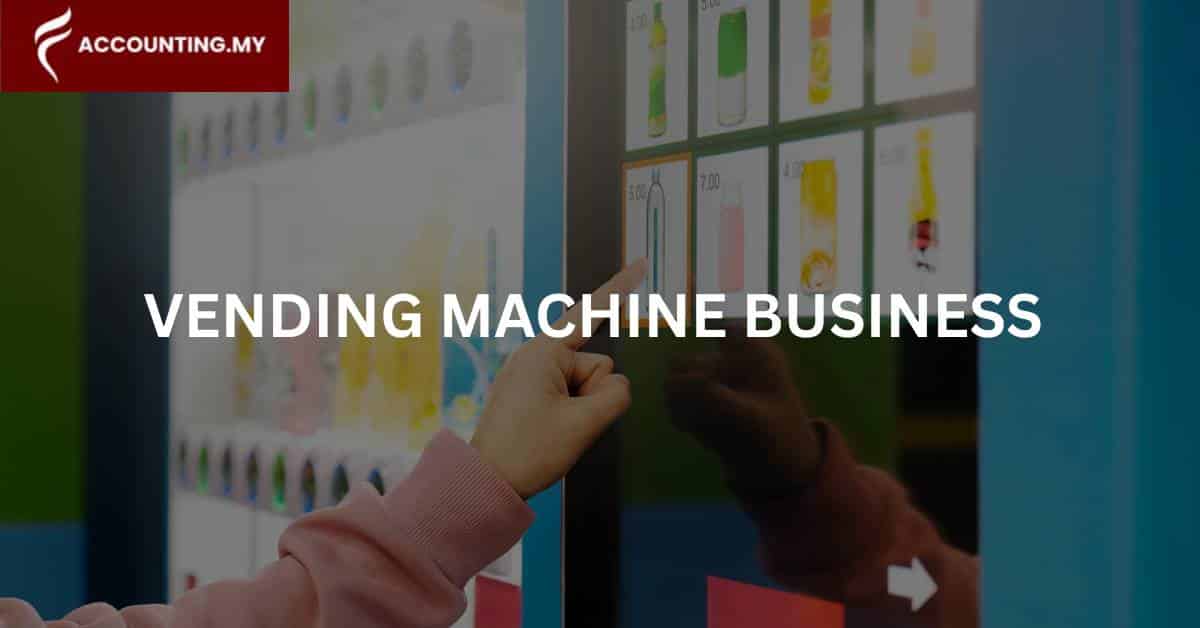Key Takeaways
- The vending machine business in Malaysia is growing thanks to urbanisation, e-wallets, and demand for quick, convenient snacks.
- Startup costs range from RM10k–30k per machine; profitability depends on location and product mix.
- A vending permit or local council approval is required for each machine.
- Best-selling items include drinks, snacks, toiletries, and healthier options like nuts and RTD coffee.
- Smart vending with cashless payment integration improves revenue, while poor locations lead to slow ROI.
Starting a vending machine business in Malaysia typically costs RM10,000–30,000 per machine, plus the right permits and a solid location.
Sounds easy, right? Not quite. Put your machine in the wrong spot and it’ll collect dust faster than a kopi dispenser at a durian stall.
But here’s the twist: while it may not sound like the grandest venture, the vending machine business is one of the most underrated and surprisingly profitable ways to generate steady income, if you do it right.
Today, we will cover real costs, accounting considerations, licensing rules, product trends, and the challenges of running a vending machine business in 2025.
What Is a Vending Machine Business?
A vending machine business is basically retail without a shopkeeper, it has automated sales that run 24/7 with minimal staff costs, very minimal.
Machines can sell anything from bottled water and snacks to toiletries and even electronics. You, yes you, only need to handle the restocking, maintenance, and profit collection.
Business Models You Can Choose
- Own machines outright: Higher startup cost (RM8k–20k per machine), but you control the products, prices, and profits.
- Lease machines: Lower upfront investment, but earnings are shared or capped. Suitable if you’re testing the waters.
- Franchise: Ready-made branding and supplier networks, but royalty fees cut into margins.
In Malaysia, vending machines are now more than Coke-and-chips machines. They’re found in LRT stations, universities, hospitals, and even housing laundry capsules in condominiums.
Why Start a Vending Machine Business in Malaysia?
The vending machine business in Malaysia is expanding rapidly, with the smart vending market valued at USD 103.58 million in 2024 and projected to hit USD 220.29 million by 2032 according to Aviaan’s Accounting.
This steady growth is driven by urban demand, cashless payment, and consumer preference for convenience.
Benefits & Drivers
- Urban density means foot traffic: LRT/MRT stations, universities, hospitals, office blocks are often busy 24/7. Machines placed in these zones tend to earn more.
- Cashless payments are the standard: Touch ’n Go, GrabPay, DuitNow QR, Malaysia has gone cashless with e-wallets. Malaysia had 2.6 million DuitNow QR acceptance points by end-2024, so QR/card acceptance on your machines usually lifts conversion.
- People want food or drinks at weird hours: Maggi at 2 am, kopi at dawn, energy drinks for overnight workers. Vending machines meet demand when many stores are closed.
- Low ongoing labour costs: No cashier, no shift scheduling, lower staff overhead. You still need to restock/maintain, but way lower operating staff cost compared to a full F&B or retail outlet.
- Government and policy support:SME grants, digitalisation incentives, automation-friendly regulations make it easier to set up, register, and comply.
- The “healthy snacks” trend is growing: People are more conscious of sugar and calories, so machines with healthier options tend to attract premium pricing and a positive public image.
How Much Does It Cost to Start?
Good question, and the good news is that the barrier of entry isn’t high.
You don’t need the capital of a café or minimart to get started, but you’ll still need a realistic budget for machines, stock, compliance and more importantly, rent.
Cost Element | Average Cost (RM) | Notes |
New vending machine | 8,000 – 20,000 | Cashless-ready smart models are on the higher end. |
| Refurbished machine | 5,000 – 10,000 | Cheaper to start, higher risk of breakdowns. |
Initial stock | 800 – 1,500 | Snacks, drinks, or hygiene products. |
Licensing & permits | 300 – 1,000 annually | Local council permits (e.g., DBKL, MBPJ). |
Insurance & security | 500 – 1,200 annually | Theft, vandalism, liability. |
Monthly maintenance | 300 – 500 | Restocking, servicing, cleaning. |
Location rental / commission | 500 – 2,000 monthly | Rental for high-traffic spots, or revenue share (10–20%) with property owners. |
Profitability Snapshot
- Average revenue: RM2,000 – RM6,000 monthly (higher in LRT stations, universities, hospitals).
- Break-even period: 12 – 18 months (faster if rent is low and traffic is high).
Location Rental / Commission
- Typical range: RM500 – RM2,000 per month, or 10–20% commission on sales.
- High-traffic spots ( malls, MRT stations) often charge fixed rent.
- Offices/universities may prefer commission-based deals.
- Residential condos/gyms sometimes allow free placement in exchange for convenience to tenants.
“Always calculate ROI after factoring in rent, a RM6,000/month machine in a mall can drop to RM4,000 after landlord fees.”
Do You Need a License for Vending Machines in Malaysia?
Every vending machine in Malaysia must be licensed by the local council where it operates. Without the proper permits, your machine can be fined, confiscated, or worse, end up viral on TikTok for all the wrong reasons.
Requirements
- Local council approval: Apply to the relevant city/municipal council. Many councils license per machine and require the license to be displayed.
- Food & beverage items: Follow the Food Hygiene Regulations 2009. Food safety, expiry dates, and product labelling. For more info, check out our food handling certificate guide.
- Employment: If you hire staff for restocking/maintenance, you must register them with EPF and SOCSO.
- Foreign ownership: Companies must have ≥1 resident director. Some retail/distributive activities have foreign-participation guidelines.
Why Licensing Matters
- Legal protection: Avoid fines and machine seizures.
- Consumer trust: Licensed operators are viewed as safer and more reliable.
- Partnership opportunities:Malls, universities, and government premises will only work with compliant businesses.
Keep a copy of your permit inside the machine or clearly displayed, it reassures customers and avoids unnecessary enforcement headaches.
Where Should You Place Your Vending Machines?
Just like brick-and-mortar shops, location is everything. Put your vending machine in the wrong spot and it’ll be lonelier than a roti canai stall at 3 pm.
The right location can make the difference between breaking even in a year or dragging losses for three.
High-Traffic Hotspots
- MRT/LRT stations & bus terminals
Thousands of commuters pass through daily. Drinks, quick snacks, and even toiletries do well here. - Universities, dorms & schools
Hungry students, last minute assignment cramming, and no shops open past midnight = perfect for instant noodles, kopi, and energy drinks. - Office towers & co-working spaces
White-collar workers want fast access to water, coffee, or quick bites between meetings. Hygiene products also sell here. - Hospitals & clinics
Families and staff need bottled water, tissues, and snacks while waiting. Essential items often outperform luxury snacks. - Malls & cinemas
Best for impulse buys, chocolates, sodas, and toys. Competition is higher, and rent is pricier.
Niche but Promising Spots
- Gyms & fitness centres: Protein bars, isotonic drinks, energy boosters.
- Residential condos: Laundry capsules, bottled water, and household essentials.
- Factories & industrial parks: Workers on shifts buy drinks and meals
- Service areas (Hair salons, laundromats, clinics): Customers waiting for services often want bottled water, snacks, tissues, or hygiene items, perfect for quick vending.
Bonus Tips:
University dorm lobbies often outperform upscale malls: Students don’t mind RM3 Milo at 2 am.
Negotiate exclusive placement contracts: Especially with offices or gyms, they’re cheaper than mall rentals and guarantee steady traffic.
Observe foot traffic before committing rent: Spend a few days counting heads at potential sites to estimate daily exposure.
Note: Do not vend cigarettes or vapes, vending-machine sales of smoking products are prohibited under Malaysia’s Act 852.
What Vending Machine Products Sell The Best in Malaysia?
The Malaysian market is unique, most ais kosong is free in mamaks and our drinks are fairly affordable, but people are still willing to pay RM2.50 for bottled water in vending machines.
Category | Examples | Avg Price (RM) | Key Insight |
Drinks | Milo, water, Coca-Cola, RTD coffee | 2.0 – 4.5 | Biggest share: Milo is top seller in 85% of machines ( Vechnology, 2024) |
Snacks | Chipsmore, Mister Potato, instant noodles | 2.5 – 5.0 | Student & office favourites; instant noodles strong in dorms |
Healthy | Low-sugar sodas, RTD teas, nuts | 3.5 – 6.0 | Growing demand in gyms/offices due to sugar-tax & wellness trends |
Essentials | Tissues, masks, sanitary pads | 1.5 – 6.0 | Sell best in hospitals, clinics, condos as “rescue items” |
How Do You Run Operations?
Running vending machines isn’t fully “passive income.” Machines don’t restock themselves (at least not yet).
- Restocking: Weekly for drinks/snacks, more often in hot spots.
- Maintenance: Monthly servicing prevents breakdowns.
- Payments: Smart vending integrates Touch ’n Go, GrabPay, DuitNow QR.
- Tracking: AI-enabled machines send alerts when stock runs low.
- Accounting: Use SQL accounting software to match revenue with e-wallet deposits.
Is the Vending Machine Business Really That Profitable?
Yes, if you choose the right locations and products. Location is extremely important here, we cannot understate it.
- Monthly income per machine: RM2,000–6,000.
- Profit margin: 30–50% (higher with bulk buying).
- ROI: 12–18 months for new machines.
Ways to boost profitability:
- Exclusive placement contracts with offices/universities.
- Stocking higher-margin items (energy drinks, hygiene products).
- Running promotions for e-wallet users (RM1 off via GrabPay).
Challenges of Running a Vending Machine Business in Malaysia
No business is truly “automatic.” While vending machines reduce staff costs and run 24/7, they come with their own set of headaches. Here’s what you need to know before diving in:
1. Competition for Prime Locations
- Problem: High-traffic spots like MRT stations, malls, and hospitals are already saturated with existing operators.
- Result: Newcomers often get pushed into lower-traffic areas, making it harder to reach break-even quickly.
- Solution: A well-placed machine in a university dorm can outperform a badly positioned one in a popular mall.
2. Shifting Consumer Preferences
- Problem: Malaysians are increasingly health-conscious, cutting back on sugary sodas.
- Result: Stocking only sodas and chips may leave you with unsold inventory and wasted capital.
- Solution: Offer healthier alternatives, low-sugar drinks, RTD teas, protein snacks, without abandoning bestsellers like Milo.
3. Technical Glitches & Maintenance
- Problem: Cashless payment readers sometimes fail, software updates crash, or machines jam.
- Result: Each downtime = direct revenue loss, plus frustrated customers who may never return.
- Solution: Even a “smart” machine still needs weekly checks and occasional part replacements.
4. Security & Vandalism
- Problem: Machines placed in unsupervised areas can be vandalised, broken into, or used without payment.
- Result: Repairs and restocking losses can eat into monthly profits.
- Solution: Choose well-lit, monitored locations and consider insurance for theft/damage. Places that have security making their rounds is a great find.
5. Rental & Commission Pressures
- Problem: Landlords of malls, LRT stations, or office towers often charge RM500–2,000 monthly rent or take a 10–20% commission on sales.
- Result: High rental eats into margins, especially if daily sales are inconsistent.
- Solution: ROI projections must always factor rent; a RM6,000/month machine can net only RM3,500 after landlord fees.
6. “Set and Forget” Myth
- Problem: Many assume vending machines = passive income. In reality, machines require restocking, cleaning, cash collection, and customer service.
- Result: Neglect leads to empty shelves, broken readers, and lost customers.
- Solution: Treat it like a business, not a side hobby, to keep profits steady.
Ready to Start Your Vending Machine Business in Malaysia?
The vending machine business in Malaysia is low-barrier, scalable, and built for lifestyles of convenience and cashless payments.
If you’re serious about starting, don’t get stuck in the red tape. At Accounting.my, we help new business owners with business license, licensing applications, and financial compliance so you can focus on running and scaling your vending machine network.
Start smart, avoid costly mistakes, and let the best accounting firm in Malaysia handle the paperwork while you handle the profits.
Frequently Asked Questions About Vending Machine Business in Malaysia
Between RM10,000–30,000 per machine, including stock and permits.
Yes, from local councils like DBKL or MBPJ.
Yes, ROI is achievable in 12–18 months with the right locations.
Drinks, snacks, instant noodles, toiletries, and healthier snack options.
Modern machines accept Touch ’n Go, GrabPay, DuitNow QR, and credit cards.
Yes. Many Malaysians treat it as a part-time income stream.















